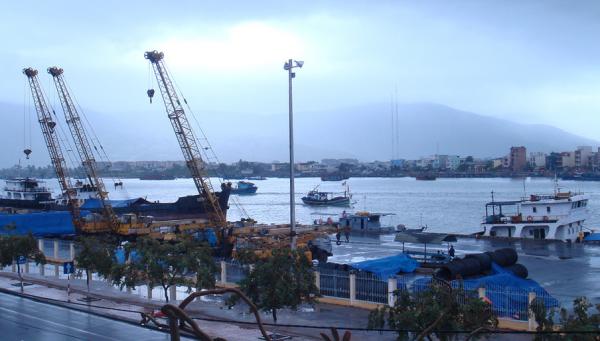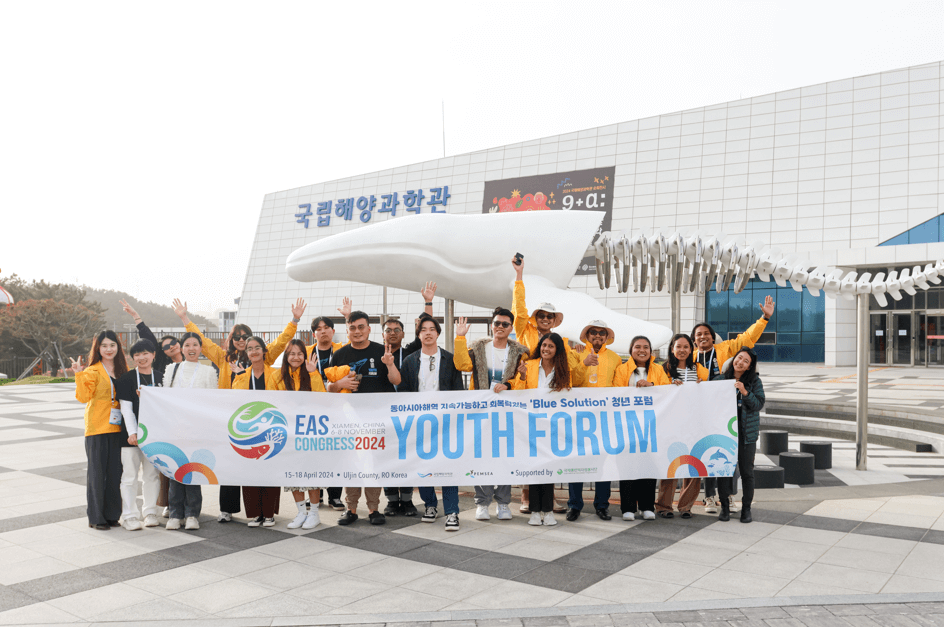First bilateral meetings held for the Blue Solutions project
Friday, 3 September 2021

Overlooking Da Nang Port by Thang Nguyen / Wikicommons
The maritime transport sector is a significant source of greenhouse gas emissions, alongside other forms of air pollution. International shipping alone is thought to produce around 3% of such emissions, which does not take into account domestic shipping, emissions due to port activities, and the hinterland movement of goods to and from ports. Activity causing these emissions are expected to continue to grow into the future, as economies and populations expand, and as goods currently shipped through other forms of transport are shifted onto relatively more efficient seaways.
The countries sharing the seas of East Asia are deeply interconnected with maritime transport. The region hosts large shipbuilding industries, the busiest ports, and sees the majority of shipped goods pass through its waters. As part of their commitments towards combating climate change, these countries are taking actions to reduce the impact of maritime transport on climate change. They welcomed the development of the IKI/IMO/PEMSEA Project on Reducing Maritime Transport Emissions in East and Southeast Asian Countries, also known as the Blue Solutions project which aims to support countries around the seas of East Asia as they transform their maritime transport sector towards a low-carbon future in line with the aspirations, targets, and measures of the IMO GHG Strategy, ASEAN Transport Strategic Plan 2018-2025 and PEMSEA’s Sustainable Development Strategy for the Seas of East Asia (SDS-SEA).
The Blue Solutions project is funded by the German government through the International Climate Initiative (IKI) and will be jointly coordinated by the International Maritime Organization (IMO) and PEMSEA.
To deepen engagement between the project and its participating countries, national inceptions workshops are being held for each. So far, two have taken place:
- The National Inception Workshop for the Philippines was held on 12 – 13 August 2021 and was facilitated by PEMSEA Executive Director Ms. Aimee Gonzales and Department of Transportation (DoTR) Assistant Secretary for Planning and Project Development Dr. Maria Sheilah G. Napalang.
- The National Inception Workshop for Viet Nam was held on 19 – 20 August 2021 and was facilitated by Ms. Gonzales and VINAMARINE Deputy Director of the Department of Science, Technology, and Environment, Ms. Tran Thi Tuyet Mai Anh.
Participants in the Philippine workshop included representatives from the Department of Transportation (DOTr), Department of Environment and Natural Resources (DENR), Climate Change Commission (CCC), Maritime Industry Authority (MARINA), Philippine Ports Authority (PPA), Cebu Ports Authority (CPA), Philippine Coast Guard (PCG), Supply Chain Management of the Philippines (SCMAP), and Confederation of Truckers Association of the Philippines (CTAP). Participants in the Viet Nam workshop came from VINAMARINE, the Vietnam Administration of Seas and Islands (VASI), and the Vietnam Ports Association including Haiphong Port, Saigon Newport, and Saigon Port. The workshops were also attended by representatives from IMO and BMU.
The workshops are divided into two parts; the first part introduces the proposed project and its application towards the country while providing an opportunity for open discussion with participants on the challenges facing their country, and existing plans they have for the maritime sector and greenhouse gas emissions. The second part sees more detailed and more technical discussions, led by the project preparation team Adrian Ross, Zabi Bazari, Juergen Lorenz, Marco Sprong and coordinated by Ms. Nadine Bresemann, Head of Maritime Transport, PEMSEA. This part involves a detailed explanation on potential emissions reduction pilot project concepts, and the process necessary to produce a baseline greenhouse gas emissions assessment.
Participants from each country shared an overview of their respective offices' greenhouse gas reduction policies and indicated how this Blue Solutions might help them create and enhance their policies moving forward. Agencies involved noted that they would share their emissions and fuel combustion data and ship profiles, to help provide the data needed to monitor the national pilot project.
Further workshops and consultations are expected to take place in other participating countries such as Malaysia, Thailand, Vietnam, and Indonesia. Relevant agencies in China, Japan, RO Korea, and Singapore will also be engaged as knowledge partners. A regional project proposal incorporating the national project proposals is expected to be developed before the East Asian Seas (EAS) Congress 2021 on 1 December 2021.
Proceedings from these events are available for the Philippines and for Viet Nam



